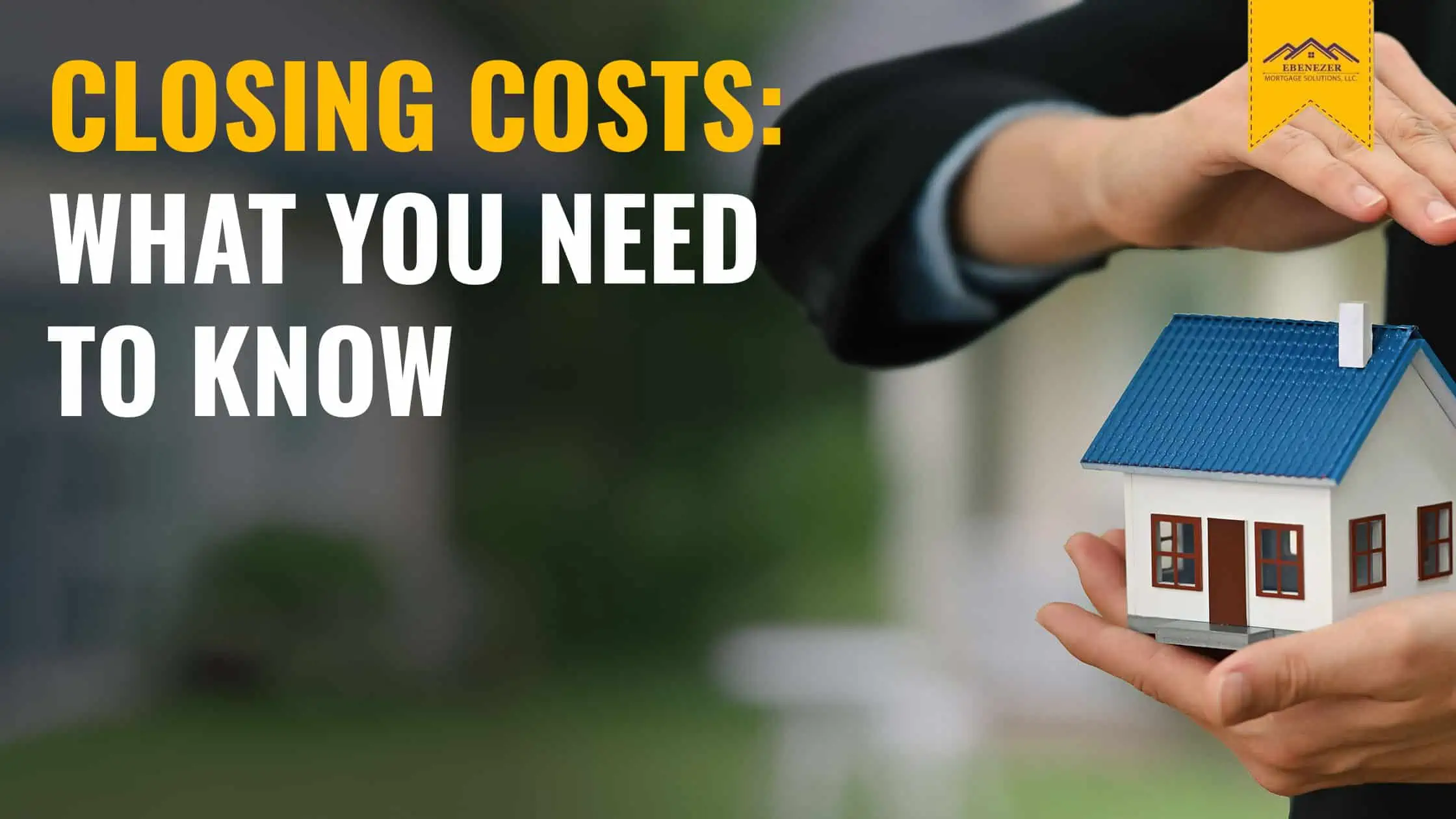Your Most Trusted Partner in Home Purchase Loans & Refinance Loans
Open Hours: Mon. - Fri., 9:00 a.m. - 6:00 p.m.

Closing on a new home is an exciting and monumental milestone, but it's essential to be prepared for the financial aspects that come with it. One significant consideration is closing costs. Understanding what closing costs entail and how they impact your homebuying budget is crucial for a smooth and transparent real estate transaction.
In this guide, we'll provide insight into what closing costs are, how they are calculated, who is responsible for them, and strategies to reduce them. This is to ensure that you're equipped with the necessary knowledge to make informed decisions on your home-buying journey.
The term 'closing costs' refers to the collection of fees and expenses you pay to complete a real estate transaction. It can include items such as loan origination fees, appraisal fees, title searches, title insurance, surveys, taxes, deed-recording fees, and credit report charges. These costs are additional expenses on top of the property's purchase price and need to be paid out of pocket by the buyer.
Closing costs typically range from 3% to 6% of the loan amount. For a mortgage valued at $150,000, you might pay about $4,500 to $9,000 in closing costs. However, it's important to note that these costs can vary significantly based on factors such as your location, your lender, and the type of loan you choose. That's why it's essential to obtain a loan estimate from your lender within three days of applying for a loan. Although the specific costs can differ significantly, having an estimated closing costs can help potential buyers plan their budgets more effectively.
When it comes to closing costs, who pays can vary based on the type of loan and negotiations between the buyer and seller. Here's a general overview of different loan types:
In most cases, the buyer covers the majority of closing costs for a conventional loan. However, through negotiations, sellers may agree to contribute a portion of the closing costs through 'seller concessions.' Seller concessions may range from 3% to 9% of the total closing costs, depending on the home's purchase price, the size of the down payment, and the occupancy type.
For Federal Housing Administration (FHA) loans, closing costs usually fall on the buyer as well. Seller concessions are still allowed and are capped at 6% of the closing costs, regardless of the size of the down payment.
With Veterans Affairs (VA) loans, sellers can contribute up to 4% of the purchase price or appraised value, whichever is lower, to cover the closing costs. This includes fees such as the VA funding fee, prepaid property taxes, and other closing costs.
Jumbo loans, typically used for high-value properties, often require buyers to cover their closing costs. These costs can be substantial due to the larger loan amounts, but negotiations between the buyer and seller may still lead to a shared or seller-covered expense agreement.
At Ebenezer Mortgage Solutions, our goal is to guide you through the intricacies of the home-buying process, including understanding who covers closing costs. Reach out today to discover personalized loan solutions and expert guidance throughout your home-buying experience.

Closing costs are a crucial consideration for anyone purchasing a property in the realm of real estate. These costs encompass various fees and expenses that buyers need to cover before reaching the closing date of their property purchase. Let's delve into some common closing costs you might encounter:
Some lenders charge an application fee to process your loan request. This fee, which varies by lender, is often used to cover the initial administrative costs, like credit report fees, associated with evaluating your loan application. Application fees can range up to $500 and may be applied separately or counted towards the most closing costs.
To determine the property's value, your lender will order an appraisal through a third-party appraisal management company. A professional appraiser assesses the home's worth, considering its condition and market value. Appraisal fees typically fall within the range of $300 to $600 but can be higher depending on the property and are a part of your total pay closing costs.
In certain states, real estate transactions, particularly closing on a housing loan, require the involvement of a real estate attorney. Attorney fees cover the cost of legal services, including coordinating the closing and preparing paperwork for the title transfer and transfer taxes. The charges for these services vary based on state and local rates.
This fee, also known as the settlement fee, is paid to the escrow company or attorney facilitating the closing process. It covers the cost of preparing and recording the mortgage and other legal documents. The closing fee can fluctuate based on your state's requirements and whether an attorney must be present at your closing. This fee often includes lender's title insurance and can be calculated using a closing costs calculator to estimate your total expenses.
Courier fee covers the cost of transporting mortgage documents during the real estate transaction. You can expect to pay around $30 for courier services if your lender imposes this charge.
The credit report fee, charged by lenders, covers the cost of pulling your credit report from the three major credit bureaus and examining your credit score. Typically, this fee ranges from $10 to $100, depending on the lender and the complexity of the buyer's credit situation.
Discount points, also known as mortgage points, are fees paid directly to the lender at closing in exchange for a reduced interest rate. This is also known as “buying down the rate”. One discount point, which usually costs $1,000, is equal to 1% of your loan amount.
Escrow funds are essentially a safety net, collected by the lender at closing to ensure that property taxes, homeowner's insurance premiums, and mortgage insurance are paid on time. The amount can vary widely, but typically, you can expect the escrow to include a few months' worth of expenses.
With an FHA loan, you'll need to pay an Upfront Mortgage Insurance Premium (UFMIP) at closing. The current UFMIP is 1.75% of your initial loan amount.
Flood Certification is a document that verifies the flood risk of the property. The cost for this certification ranges from $15 to $25, which goes to the Federal Emergency Management Agency (FEMA) to plan for emergencies and target high-risk zones.
Most mortgage lenders require homeowners insurance to cover potential damages to your home. You may be required to pay a year's worth of homeowners insurance at closing. The cost is generally around $50 per month for every $100,000 in home value.
While optional, owner's title insurance protects you from potential title disputes that may arise after the purchase. It's a one-time cost ranging from 0.5% to 1% of the purchase price and can cover you if a previous owner brings a lawsuit against you after the purchase.
In some states or with certain loan types, a pest inspection fee may be required. This fee goes towards having a licensed pest control company inspect the property for any infestations or damage caused by pests, such as termites, which could affect the home's value and safety. Pest infection fee typically costs around $100 to $200, and the responsibility for covering this fee may vary among the buyer, seller, or lender.
Private Mortgage Insurance (PMI) is a policy that a borrower must purchase if their down payment is less than 20% of the home's value. This insurance protects the lender from loss if the borrower defaults on the loan. The cost of PMI varies, but it typically ranges from 0.5% to 1% of the entire loan amount per year. For instance, on a $200,000 loan, the annual PMI could be between $1,000 and $2,000. The PMI is typically included in the monthly mortgage payment until the borrower has achieved at least 20% equity in the home.
Property tax is levied by the local government and the amount varies widely based on the property's location and assessed value. Your lender may require you to pay up to a year's worth of property tax dues at closing.
The recording fee is typically charged by the county to record the new deed and mortgage. This fee ensures the legality and transparency of the property transfer, providing a public record of the transaction. The cost of the recording fee can vary depending on the county but it generally falls between $25 and $250.
Calculating mortgage closing costs is a crucial step in the home-buying process, as it allows you to anticipate and plan for the additional expenses associated with acquiring a property. Keep in mind that closing costs range from 3% to 6% of the loan amount. Nonetheless, here are some steps that can help you estimate your closing costs:
Reducing closing costs can significantly ease the financial burden of buying a new home. Here are some effective strategies to help minimize these expenses:
Shopping around for different lenders can be an effective strategy to mitigate the burden of closing costs. It's essential to remember that not all lenders are created equal, and the terms they offer can vary significantly.
To effectively shop around for lenders, consider the following steps:
During the negotiation phase of a property purchase, a potential buyer may request the seller to contribute towards the closing costs, a strategy that can significantly reduce the financial burden on the buyer. This is often referred to as a seller concession or seller contribution.
It's a legal and quite common practice, especially in buyer's markets where sellers are eager to close deals. The seller's contribution can take different forms, such as paying for certain fees outright or offering credit at closing.
However, it's important to note that some lenders have limits on how much a seller can contribute. Therefore, buyers should discuss this option with their lender and mortgage broker to ensure it's a feasible strategy in their specific situation.
Incorporating your costs into the mortgage can be a viable strategy to alleviate immediate out-of-pocket expenses. This approach, known as 'rolling in' the costs, essentially increases your mortgage amount but spreads the cost over the life of the loan, softening the initial financial blow.
Ready to turn your homeownership dream into reality? Look no further than Ebenezer Mortgage Solutions. Our experienced team offers tailored solutions, transparent guidance, and unwavering support throughout your journey to owning a home.
Reach out to us today at (813) 284-4027 to schedule a consultation and take the first step toward making your homeownership dreams a reality.
Yes, closing costs can indeed be negotiated with the seller. This is typically done during the contract negotiation phase, where both parties can agree on who will cover these necessary transaction expenses.
Yes, it's possible to obtain a mortgage loan that includes closing costs. This is often referred to as a "no-closing-cost" loan. However, these costs are typically rolled into the loan, potentially increasing your monthly payments.
The difference between closing costs and a down payment lies in their purpose. A down payment is a portion of the property's purchase price while closing costs cover fees incurred during the mortgage transaction process.
Certain closing costs can be tax deductible, such as mortgage interest, real estate taxes, and some loan origination fees. However, it depends on specific criteria and tax laws, so consulting a tax professional is advisable.
If you find yourself unable to afford closing costs, you have several options. These include negotiating for the seller to pay the costs, applying for assistance programs, or incorporating costs into your mortgage loan.
